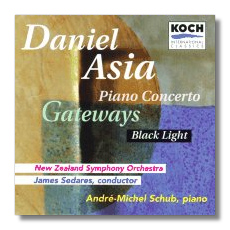
The Internet's Premier Classical Music Source
Related Links
- Latest Reviews
- More Reviews
-
By Composer
-
Collections
DVD & Blu-ray
Books
Concert Reviews
Articles/Interviews
Software
Audio
Search Amazon
Recommended Links
Site News
 CD Review
CD Review
Daniel Asia

Orchestral Works
- Gateways
- Concerto for Piano *
- Black Light
* André-Michel Schub, piano
New Zealand Symphony Orchestra/James Sedares
Koch International Classics 3-7372-2
Executive Summary: Expansive, mostly tonal clearly structured, music. Excellent performances in terrific sound. More for the collector.
Daniel Asia was born in 1951. He is a pupil of Jacob Druckman, Stephen Albert, Gunther Schuller and Isang Yun. I first heard the name of Daniel Asia when he joined the faculty of the University of Arizona. Having taught there myself for several years, some of my former colleagues sent me tapes of his music, the Symphony #1 and a Scherzo Sonata for piano, a work which was the genesis of the First Symphony. I found it well crafted but yet I was not convinced of any distinctive merit to be found in the music. This recent disc has increased my appreciation for his creativity but with some reservations. The First Symphony struck me as being a rather thorny work in which the composer seemed ill at ease with the stylistic mode of expression. The Second and Third Symphonies displayed a move to a simpler, more accessible style, one in which seems more supportive of the his compositional temperament. The diverse stylistic tendencies of his output thus far would seem to be suggestive of the aesthetic plurality of his pedagogical lineage.
"Gateways," a five minute overture dating from 1993 was written on commission from the Cincinnati Symphony. It is an immensely appealing, extroverted work written in a highly accessible style. It is full of syncopated rhythms, suggestive at times of popular music, expertly orchestrated. At times the piece reminds me of Stravinsky's Circus Polka.
The Piano Concerto written the following year is fairly much in the same harmonic idiom. From a stylistic standpoint I am reminded of the music of Tippett, his Piano Concerto in particular, and "Riverrun" by Stephen Albert. From time to time I hear some of the harmonic sense found in much of what I have heard by Torke. Listening to the first movement I found myself picking out all of the stylistic influences. Only after the first few listenings was I able to get beyond those references and found it to be engaging, expertly crafted music. The second movement was almost bereft of distinguished thematic material and at a duration of twenty minutes, far outstayed its welcome. While it was marked with some expressive moments, it seems to me that it would be much more convincing at half its length. The spirited finale is filled with many of the aspects that make for a successful concerto, including repeated iterations of the thematic material offering the soloist an opportunity to display some of that technique they work so hard to perfect. Considered as a whole, there is much that I find attractive about this work, especially in the first movement. It is the most convincing musical statement I have heard from him.
"Black Light" is a two movement work derived from a portion of Asia's "Scherzo Sonata" for piano of 1987. Its realization in orchestral form is a relatively intense work which quickly traverses a variety of moods without really conveying to my ears much of a sense of purpose. Asia has come a long way in a short period of time. The first movement of his Concerto is my first indication that his potential as a composer is being fulfilled.
André-Michel Schub gives an expert performance of the Concerto. Sedares' expert conducting is clearly in sympathy with the music. The playing of the New Zealand Symphony Orchestra is excellent. Great recorded sound.
Copyright © 1998, Karl Miller


















